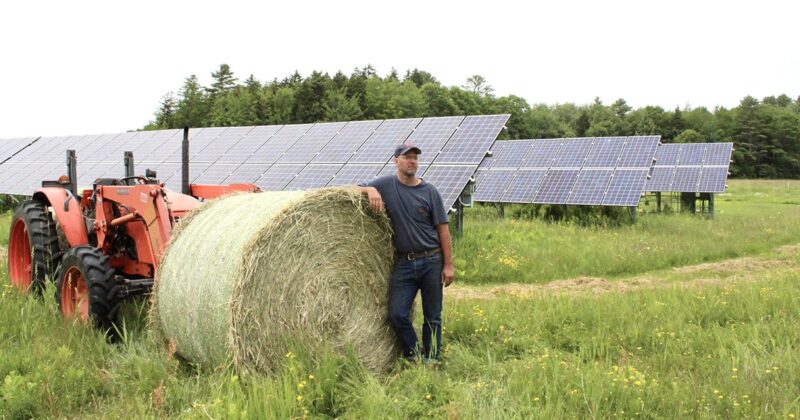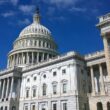The fate of net metering in New England — and across the United States — remains unknown, but resistance to its erasure is mounting.
More than 450 organizations, 57,000 individuals and 37 states submitted comments opposing a petition that could set a national precedent and end a billing practice that credits users for investing in solar. Twenty-two organizations and individuals filed support for the proposal. The public comment window ended on June 15.
The Federal Energy Regulatory Commission (FERC) has not yet set a date to rule on the petition, which was filed by the New England Ratepayers Association in April.
“There is no schedule for the commission to make a decision. It will act when it is ready,” said Craig Cano, media relations specialist for FERC. Cano said that each petition poses its own set of circumstances and FERC does not keep track of procedural time frames.
Maine Gov. Janet Mills was among those who spoke out against the petition, asking commissioners to “outright dismiss this petition.”
More than 6,000 ongoing projects in Maine rely on the benefits of net metering and the petition “would put at risk Maine’s existing renewable energy programs and the economic benefits enjoyed by thousands of citizens,” Mills wrote in a letter to FERC.
RELATED: Petition threatens to derail solar incentives across New England
The Maine Public Utilities Commission and Maine Office of the Public Advocate also issued statements opposing the petition.
“We’re not going away,” said Barry Hobbins, Maine’s Public Advocate, whose job is to look out for the interests of public utility customers in Maine. “This could really undercut the solar industry.”

Current solar customers get full or partial credits for the extra energy they generate but don’t use under state-controlled net metering. NERA’s petition would shrink the credits solar users receive from utility companies by deeming the transactions wholesale instead of retail. This shift would take away the ability of states to set their own solar credit standards in favor of giving control to the federal government.
Marc Brown, president of the New England Ratepayers Association, said the large-scale response to the petition was on par with his expectations.
“We were not surprised by the level of opposition to the petition, given the vast dependency by the solar energy sector on the ratepayer-financed subsidies of retail net metering,” Brown told the Maine Monitor in an email. “That does not dissuade us at all from the conviction that retail net metering is an unfair cost-shift that violates federal law in its implementation, and that FERC should assert its jurisdiction over these wholesale transactions.”
State v. federal authority
Three of Maine’s four congressional delegates have spoken out against the petition, taking particular issue with the threat of reduced local authority.
Sen. Angus King, an Independent, joined nearly two dozen congresspeople in signing a letter to FERC Chairman Neil Chatterjee urging the commission to reject the petition on May 26.
“FERC should not upend 45 existing state policies – and certainly not at the behest of a group funded by 12 anonymous donors whose interests are unknown to FERC or the public, and which may be antithetical to the goals of the Federal Power Act,” the letter stated.
NERA is a 501(c)(4), a type of nonprofit that is allowed to lobby and is not required to disclose its financial contributors.
Rep. Chellie Pingree and Rep. Jared Golden, both Democrats, signed a similar letter on June 15, stating that the jurisdiction over net metering programs belongs to states, not the federal government.

Nathan Phelps has been tracking the 57,523 public comments in opposition and the 22 public comments in support of the petition since it was filed on April 14, 2020. Phelps is the regulatory director of Vote Solar, a nonpartisan advocacy group working to expand access to affordable solar energy nationwide.
“There is overwhelming opposition to the petition and FERC should dismiss this petition outright,” he said. “This really boiled down to the federal government potentially taking away some authority from the states. So the states — in our mind — really had to have a strong voice in order to protect their authority.”
Phelps reached out to states to make them aware of the petition, created a website to streamline the process of submitting letters to state governors and FERC about the petition and created a sign-on letter where organizations could add their name in opposition of the petition.
Local impact
With the price of solar steadily dropping over the last 10 years, renewable energy advocates, clean energy consumers and some government regulators remain eager to accelerate the transition to a clean-energy economy. The Mills administration has incentivized distributed energy and solar projects to help Maine meet its renewable energy goals and reduce overall emissions.

“Maine is a particular market of interest given the amazing things that have happened over the past couple years,” said Jeremy McDiarmid, vice president of the Northeast Clean Energy Council. “I think that’s (Maine’s) a market that would be disproportionately impacted by the NERA petition.”
In Maine, net metering programs give solar users 100 percent credit back on the extra energy they produce but don’t consume. Neighboring states such as New Hampshire and Massachusetts don’t get a full credit back on their solar investments, which means Maine’s market would be hit especially hard if the petition is approved.
“It’s on the upswing,” said McDiarmid. “And because you have all this momentum and economic activity and developers getting excited about the Maine market, to create another barrier to the deployment of solar energy would dampen that enthusiasm for the Maine market and the economic benefits that come from that.”
Since the NERA petition would change net metering transactions from retail to wholesale transactions, those who have already invested in solar projects would receive fewer credits back.
“For NERA to say that there’s a wholesale sale is complete balderdash,” says Steve Weems, who filed in opposition of the petition as the executive director of the Solar Energy Association of Maine and president of Dirigo Community Solar Group, Inc. “You don’t get paid for anything, no matter what happens. You do get a credit on your bill for the amount of kilowatt hours you produce.”
Dirigo Community Solar Group manages and advocates for 14 independent community solar farms across Maine.
When solar users produce extra energy they feed that energy back to their local grid, which makes more energy available to nearby energy users. This allows utility companies to more easily distribute energy during times of peak demand, lowering the cost of energy and ultimately reducing strain on the energy grid.
“We are producing power. We’re dumping it onto the grid. We’re increasing the power, sustainability, for our region, for our state,” said Seth Kroeck, who is the largest shareholder in the Crystal Spring Farm Community Solar Project in Brunswick.
Kroeck and Maura Bannon, his partner, own and operate Crystal Spring Farm on the community solar site which allows them to run the farm completely on solar energy.
“It’s crazy,” he said of the petition. “I mean, how can you take a group of people who have made significant investments in the environment and in their businesses and change the rules on them? If anything, government and rulemakers should be bending over backwards to protect that investment, especially in unsure times like we are in right now.”
‘Bad for taxpayers, ratepayers and consumers,’ backers say

Some opponents of the petition see NERA’s filing as a calculated move to undercut an industry on the rise while NERA and its supporters say ending retail net metering has been an important issue to them for years.
“We’ve had a long-standing position going back years that net metering — as it stands — is bad for taxpayers, it’s bad for ratepayers, it’s bad for consumers,” said Tim Andrews, executive director of the consumer advocacy group Taxpayers Protection Alliance, which filed in support of the petition.
NERA and those in support of the petition argue that giving solar users credits back on their bill at a retail price increases costs to low-income ratepayers that can’t afford to invest in solar, creating what NERA calls “a ‘Reverse Robin Hood’ effect.”
The Heartland Institute, a conservative libertarian think tank known for climate skepticism and denial, echoed this argument.

“Average consumers are getting ripped off by richer consumers,” said the Heartland Institute’s lead counsel, Peter Ferrara, who filed a comment supporting the petition.
Ferrara said the Heartland Institute advocates for “climate realism,” which describes climate change concerns — including solar energy expansion and sea-level rise — as a “fairy tale that’s used by sophisticates like the people who support this kind of regulation that enables the rich to rip off the poor.”
Reports indicate that the Taxpayers Protection Alliance, the Heartland Institute and NERA all have ties to the Koch brothers, who have funded climate denial and pro-fossil fuel campaigns for roughly three decades.
Opponents: Petition will hamper accessibility of solar
Net metering proponents see NERA’s petition as an attack on making solar more accessible as it becomes cheaper and more pervasive.
“What NERA’s trying to do right now is essentially shut the growth — foreclose opportunity — for low-income communities to participate in this transformational technology,” said Phelps.
Phelps sees net metering as a way to bring distributed energy to low-income communities who may not be able to invest in solar right away but can reap the environmental and potential economic benefits of a green energy economy.
“The claims of NERA that net metering actually hurts low-income or environmental justice customers, I found particularly troubling,” said Phelps. “I think that’s an absolutely disgusting argument.”
After contending with anti-net metering policies that existed under former Gov. Paul LePage, Weems sees the NERA petition as a much larger threat.
If NERA’s petition goes through it would be, “worse by far, because at least under Gov. LePage, the state was in control of what it was doing,” said Weems. “Economically it would be more devastating to solar than anything he ever did.”
The United States has seen 600,000 job losses within the renewable energy sector and a 38 percent drop in solar jobs due to the coronavirus pandemic. Solar advocates remain in the dark with no clear schedule for when FERC will make a decision on NERA’s net metering petition.
“It’s possible that if (NERA is) just trying to create chaos for the renewable energy industry, having this type of uncertainty linger could be effective. But I don’t know what they’re trying to do,” said Phelps.




